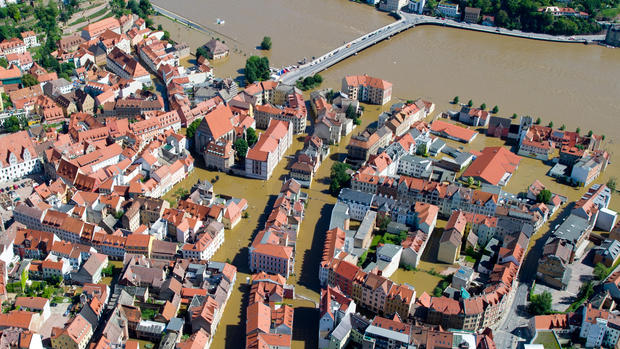Germans airlifted from roofs as deadly Europe floodwaters rise
Updated 12:30 p.m. ET
PRAGUE At least 16 people have died and four others are missing in the floods that have ravaged central Europe, authorities said Wednesday as swollen rivers surged from Prague and reached Germany.
Firefighters said more than 19,000 people were evacuated from the flooding in the Czech Republic. The German city of Dresden is particularly hit by the surging waters.
The dead included eight people in the Czech Republic, four in Germany, two in Austria and one in Slovakia. At least four other people were missing in the Czech Republic, according to its interior minister.
Families in southern Germany scrambled to their rooftops and were airlifted to safety by helicopter after two levees broke and raging floodwaters swept through their village.
As thousands evacuated, chemical plants along the swollen rivers have been hastily closing down and emergency workers were bracing for new flood crests at cities along the mighty Danube and Elbe rivers.
The dpa news agency said helicopters started evacuating residents Wednesday after two levees broke and huge masses of water poured into the Bavarian village of Deggendorf.
Four farmers were rescued at the very last minute by helicopter as floods submerged their tractor, firefighter Alois Schraufstetter said, adding that water was already nearly 10 feet high in the village.
An emergency committee in Prague said the water in the Elbe was expected to reach 36 feet early Thursday morning in the northern Czech Republic, almost four times its usual height.
"This is a life-threatening situation," Schrausfstetter told dpa.
In villages around Usti nad Labem, a northern Czech city of 100,000 people, police in boats were handing out drinking water and medicine to those who had not evacuated.
Alena Lacinova despaired at how much she would have to rebuild after watching the water wash into her home. In many places, even protective barriers were unable to stop the surge.
"At the moment, we have about 2.5 meters (8 feet) of water inside. The cellar and the house are flooded," she told The Associated Press, adding that she was expecting another meter (3 feet) of water soon. "It's a pity for all those who have the same problem and have not enough money to fix it anytime soon."
Lower parts of Usti nad Labem -- built around a valley -- looked like a ghost town. About 3,000 people had evacuated, while others remained inside their homes on higher ground. Some stood on hilltops, watching the water as it rose. Police also patrolled to make sure no looting occurred.
Downstream, hundreds of people were being evacuated in the eastern German city of Dresden, where the Elbe was expected to crest Wednesday evening. Early in the day the river was running about 7 meters (21 feet) over normal levels.
In addition to hundreds of German police officers and volunteers who were helping fight the floods, some 5,600 soldiers and 2,000 members of Germany's national disaster response team were deployed across the country, filling sand bags, reinforcing levees and building elevated walkways to flooded homes.
"In Dresden, we have dozens of members instructing some 300 volunteers on how to build a temporary dam to hold the water back from one of the city's main thoroughfares," said Carolin Petschke from the national disaster response team.
In the eastern German city of Halle, the downtown area was already flooded.
In the Czech capital of Prague, Environment Minister Tomas Chalupa said the city's sewage treatment plant - which had to be shut down days ago due to high water - might be operational again in the next 24 hours. Since the shutdown, the city's effluence has gone straight into the Vltava River, which runs through the city, a top tourist destination.
Czech public television said a barrier that protects one major fertilizer plant in Lovosice was leaking Wednesday but Necas visited the plant and downplayed the danger.
"The anti-floods measures are functioning well. The protective means have fulfilled their purpose," he said, adding that all dangerous chemicals had been transported to safety.
The water was slowly receding in the hard-hit Bavarian city of Passau, leaving behind vast amounts of debris. Flooding earlier this week in Passau was the worst in 500 years.
While most parts of Prague, including its historical landmarks, were protected by high metal barriers, Prague's Zoo was particularly badly hit for a second time in 11 years by the floods. The lower side of the park was submerged and its animals had to be evacuated.
The zoo estimated the damage at $8 million but insisted it would reopen its higher parts shortly.
"The flood will not break us," it said in a statement.
